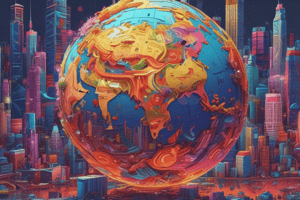Podcast
Questions and Answers
What are the positive effects of globalization?
What are the positive effects of globalization?
- Increased environmental pollution
- Overconsumption of natural resources
- Strengthened economic connections among market-oriented societies (correct)
- Inequality within states
Which of the following is a negative effect of globalization?
Which of the following is a negative effect of globalization?
- Promotion of universal values
- Improved cultural understanding
- Increased inequality between states (correct)
- Strengthening of identities
Globalization is completely beneficial and has no negative aspects.
Globalization is completely beneficial and has no negative aspects.
False (B)
What is one irony of globalization mentioned in the text?
What is one irony of globalization mentioned in the text?
The risk of comparing cultures is to regard one's own culture as more __________ than others.
The risk of comparing cultures is to regard one's own culture as more __________ than others.
What are the three viewpoints of the course?
What are the three viewpoints of the course?
Which four cultural zones does the course focus on?
Which four cultural zones does the course focus on?
Asia's economic power is expected to decline in future years.
Asia's economic power is expected to decline in future years.
What is a positive effect of globalization?
What is a positive effect of globalization?
What is a negative effect of globalization?
What is a negative effect of globalization?
Globalization weakens identity and culture of individual nations.
Globalization weakens identity and culture of individual nations.
What are the three layers of G/R/L?
What are the three layers of G/R/L?
Globalization is often equated with _____ in the context of Anglo-Saxon influence.
Globalization is often equated with _____ in the context of Anglo-Saxon influence.
What is the objective of the lecture regarding cultural zones?
What is the objective of the lecture regarding cultural zones?
Which cultural zones are focused on in the course?
Which cultural zones are focused on in the course?
What does globalization lead to in terms of resource use?
What does globalization lead to in terms of resource use?
What type of conflicts does globalization provoke?
What type of conflicts does globalization provoke?
Flashcards are hidden until you start studying
Study Notes
Globalization
- Globalization can be beneficial and harmful to society.
- Globalization leads to more efficient use of world resources and can create peace among states.
- Globalization can lead to inequality between and within states.
- Globalization can cause pollution and overuse of natural resources.
Norm and Value
- Globalized norms and ideas can become universal values that promote world stability.
Identity and Culture
- Globalization can weaken cultural identity and lead to nationalism and conflict.
Irony of Globalization
- Globalization, often associated with Anglo-Saxon culture, has seen backlash in the US and UK, characterized by anti-migration sentiment, mistrust of institutions, and opposition to weakened national sovereignty.
Growth Incident Curve
- The growth incident curve depicts a period of economic development from 1988 - 2008.
The Position of This Lecture
- There are three layers of learning: global, regional, and local.
- Global learning focuses on universal values and norms.
- Regional learning emphasizes the ideas and institutions of major regions.
- Local learning explores cultures and customs of individual countries.
Multicultural Coexistence
- It is important to focus on understanding cultures and societies different from one's own.
- Seeking to understand the ideas and social systems of different cultures, critically analyze the problems found there.
- Recognizing and integrating cultural differences to create new value.
Risk of SMC
- Comparing cultures can lead to viewing one's own culture as superior, contrary to the goal of the course.
- The objective is not to elevate specific cultural zones but to foster acceptance of others and integration within multicultural environments.
Three Viewpoints of the Course
- Focuses on four cultural zones: Western, Asian, Islamic, and Japanese.
- Targets three fields: ideational systems, social institutions/systems/customs, and contemporary social trends.
The West and Asia
- Asia is experiencing rapid economic growth, increasing its economic power while its population ratio decreases.
- There is a growing emphasis on Asian thought systems (Chinese, Indian), potentially leading to a new ideational revolution.
Comparing Cultures
- Globalization leads to the more efficient use of the world's resources.
- Globalization strengthens economic connection, which creates peaceful relations.
- Globalization increases inequality within and between states.
- Globalization results in environmental pollution and overconsumption of natural resources.
- Specific norms and ideas spread widely through globalization.
- The acceptance of universal values contributes to global stability.
- Globalization weakens the identity and culture of individual nations and societies.
- Such trends stimulate nationalism and conflict.
- Globalization, generally considered Americanization, has led to a backlash in the US and UK.
- Public feeling against migration, anti-establishment sentiments, and objections to weak state sovereignty contributed to this backlash.
- While globalization is inevitable, it provokes conflicts between rationality and emotion.
The position of this lecture in APU study
- The course focuses on three layers: global, regional, and local.
- Global: learning universal values and norms for human beings
- Regional: learning thoughts and institutions of major regions
- Local: touching upon cultures and customs of each country.
Multicultural coexistence in a global society
- The course focuses on understanding the culture and society of others.
- Learners should understand the ideas and social systems of different cultural areas.
- Critically analyzing the problems found in those areas is also important.
- Coexistence requires acceptance of cultural differences and integration to create new value.
The risk of SMC
- Comparing cultures can lead to the belief of one's own culture being superior to others.
- This is the opposite outcome the course intends to achieve.
- The course's objective is NOT to emphasize the value of a particular cultural zone.
- The goal is to promote acceptance of others and integration into multicultural environments.
Three viewpoints of the course
- Focusing on four cultural zones: the West, the Orient (Asia), Islam, and Japan
- Targeting three fields:
- Ideational/thought systems including religion, culture, and value
- Social institutions/systems/customs
- Contemporary social trends in each cultural zone or a country representing the zone
The West and Asia
- Asia's economic growth has a significant impact.
- While Asia's population ratio will decline, its economic power will increase.
- The world is moving towards a new ideational revolution, shifting from Western thought to include Chinese, Indian, and other Asian perspectives.
Studying That Suits You
Use AI to generate personalized quizzes and flashcards to suit your learning preferences.




